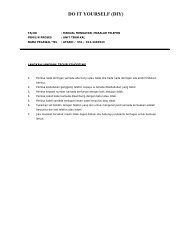chapter 6 - Malaysia Productivity Corporation ( MPC)
chapter 6 - Malaysia Productivity Corporation ( MPC)
chapter 6 - Malaysia Productivity Corporation ( MPC)
Create successful ePaper yourself
Turn your PDF publications into a flip-book with our unique Google optimized e-Paper software.
PRODUCTIVITY PERFORMANCE OF THE AGRICULTURE SECTOR<br />
The skills-training centre in each i-ZAQ project will<br />
be linked to public universities which will assist in<br />
certification and training. Five anchor companies<br />
were selected in 2011 from Perak, Terengganu,<br />
Pahang, Johor and Sabah respectively.<br />
While private sector investors will develop and<br />
operate the i-ZAQ projects, public sector funding<br />
will cover development of basic infrastructure<br />
such as access roads, electricity and clean water<br />
supplies for each of the sites. The respective State<br />
Government will provide access to land. A total of<br />
4,107 hectares were earmarked for i-ZAQs in 2011.<br />
<strong>Malaysia</strong> has the potential to tap into the world<br />
market for premium fresh tropical fruits and<br />
vegetables if compliance to global food safety<br />
standards is addressed. Premium tropical fruits<br />
such as the eksotika papaya, MD2 pineapple, KR1<br />
Rockmelon, B10 starfruit, J32 jackfuit, Cavendish<br />
banana and three highland vegetables namely,<br />
tomato, capsicum and lettuce fall within this<br />
category.<br />
Anchor companies selected to lead in the<br />
implementation of this EPP will use the extended<br />
supply chain model in managing contract farmers<br />
and coordinate production, processing, and<br />
distribution activities, including post-harvest<br />
management facilities (for example, transportation)<br />
in compliance with international standards such as<br />
GAP, GMP and HACCP.<br />
Thus far, four anchor companies have been<br />
identified. Investment by these anchor companies<br />
includes modern one-stop processing and<br />
packaging centres for fruits and vegetables, as<br />
well as opening new farms and engaging local<br />
farmers. Several TKPM have also been identified to<br />
188<br />
<strong>Malaysia</strong>n Premium Tropical Fruits<br />
be linked to anchor companies; infrastructure will<br />
be upgraded and crop processing and packaging<br />
centres (CPPCs) will be built in these TKPMs. The<br />
export volume of premium fruits and vegetables<br />
increased to 21,628 metric tonnes in 2011.<br />
The increasing demand for processed food posts<br />
potential opportunities for SMEs. The target is to<br />
strengthen the export capability of the processed<br />
food industry by reorganising and scaling up the<br />
industry through domestic anchor companies,<br />
which will be responsible for product certification,<br />
packaging, branding and managing suppliers. A<br />
total of four integrated food parks will be developed



